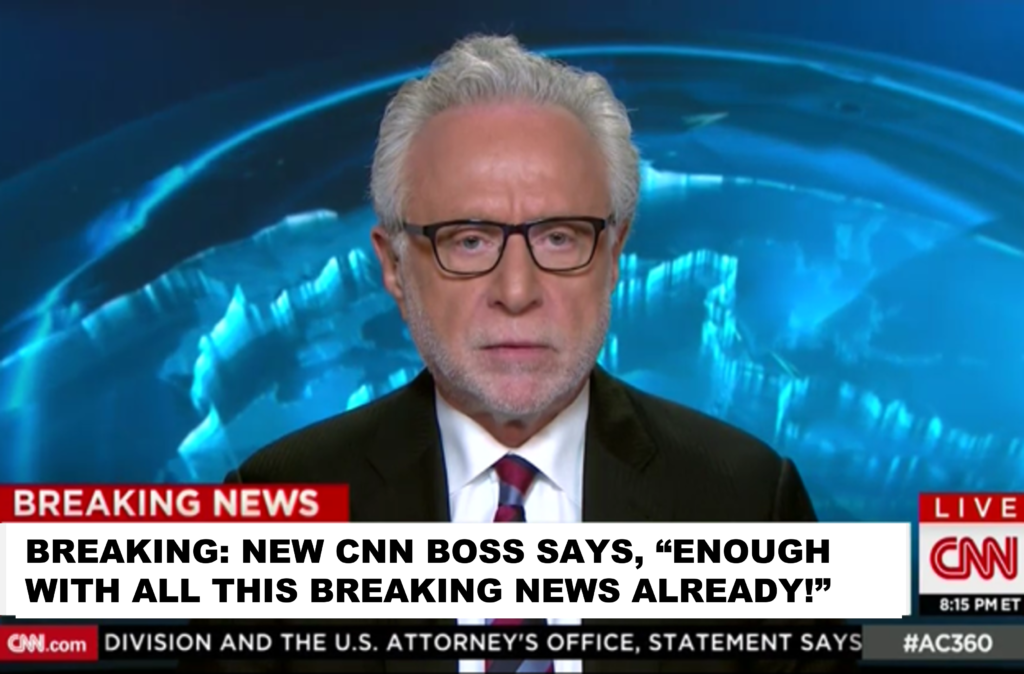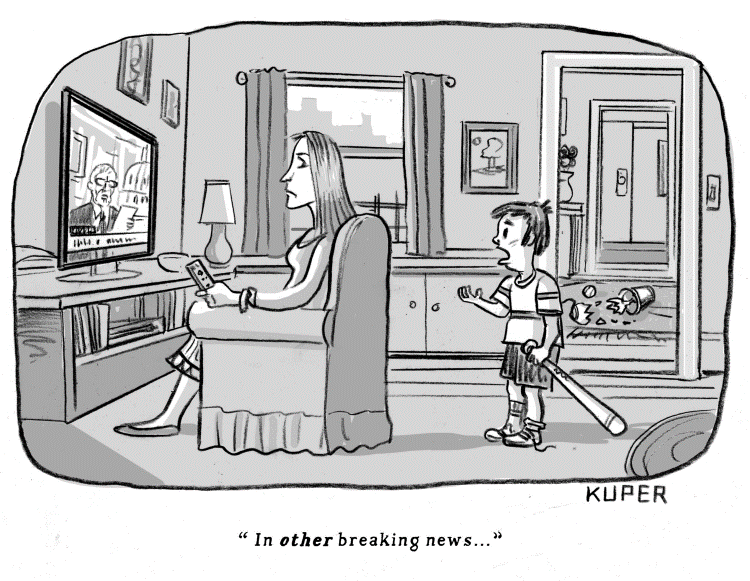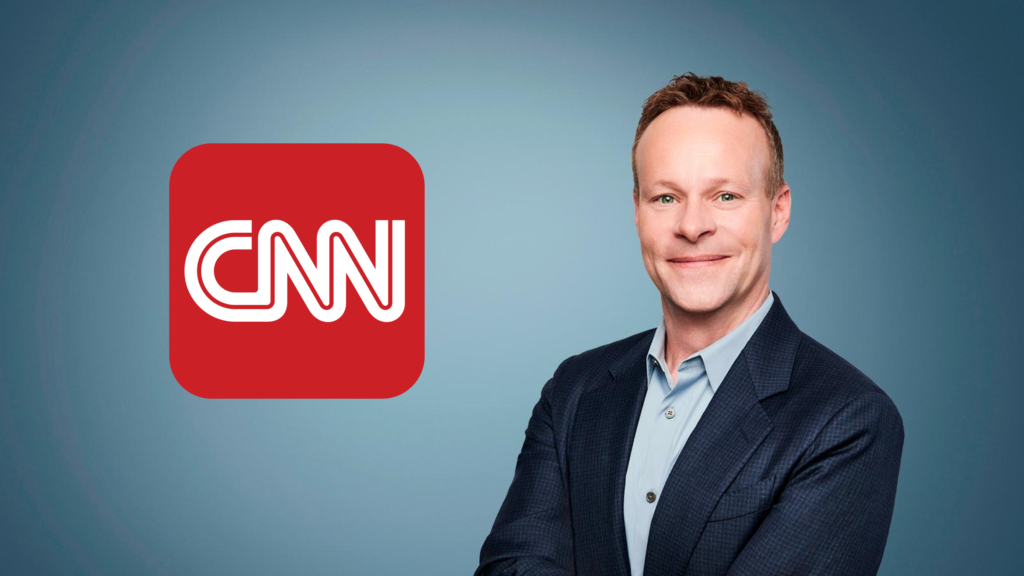
A few months ago, I blogged about Chris Licht leaving Stephen Colbert to become the CEO of CNN. It’s not often a programmer or manager can begin to redefine an entire industry with just a move or two.
But that’s precisely what Licht may be doing – not just on his own cable network, but across the new media spectrum. The odds are good that some of Licht’s decisions will even filter down to how we think of radio news. That should serve as a news flash for many public radio programmers and commercial radio news directors as they try to get their collective heads around the new guard rails of media news coverage.
In one fell swoop, CNN is serving notice they are slashing the hype, the bombast, and the overheated narrative that has accompanied cable news since Donald Trump rode down the escalator at his eponymous tower in Manhattan back in 2015.
What’s behind Licht’s thinking? The new boss has heard complaints from “people inside and outside” CNN about the overuse of the “Breaking News” handle, not to mention its ubiquity across most TV – and radio – networks and local stations. If everything is “breaking,” than nothing stands out or captures the consumer attention.
My first job was working for the Frank Magid research company in Marion, Iowa. Frank gained fame for turning around also-ran local TV news shows, vaulting them quickly to top-dog status in markets from New York to Nome. The company relied on punchy phrases like “Action News” and “Eyewitness News” for his TV news clients, handles that initially had impact on viewers. But when you hear it tens of thousands of times, these positioners lose whatever pop they once had. After a while they become wallpaper.
In the case of “Breaking News,” however the collateral damage has been even worse. The phrase is like “crying wolf.” You hear it, and you can’t help but wonder what’s the big deal. But when it precedes multiple stories an hour, several of which aren’t cataclysmic or especially new, you not only tune out. You turn off.
But for Licht, his decision isn’t just about subbing out positioning statements. He’s attempting to recast how his struggling network selects, gathers, presents, delivers, and promotes its news product. Word from Axios is that more change is in the wind at CNN, including a round of layoffs. It’s no secret the network is reeling – from the embarrassing ouster of anchor Chris Cuomo last year to a morning show that simply isn’t competitive to the swift demise of CNN+ just weeks after it launched. That should send a message to the CNN old guard that Licht is as serious as a heart attack about the mindset change his new network will have to make.

But it’s a deeper reading between the lines of Licht’s recent staff memo that has potentially sweeping implications for CNN’s competitors, as well as radio news departments, networks, and stations. If Licht’s instincts are correct, consumers are tired of the hype, the snark, the partisanship, and the vitriol.
In the Trump Era of news coverage, many once-credible journalistic organizations have lost their respective compasses. Across news platforms, what once constituted straight-ahead coverage and a recitation of facts has been summarily replaced by opinion, eye-rolling, and cutesy commentary – often at a loud volume.
According to Axios, the new emphasis is on de-emphasizing partisan shows, and championing traditional journalism.
Here’s part of how Licht reportedly boiled it down for CNN’s rank-and-file. It is not necessarily in the order he wrote it, but CNN’s new head honcho has crafted a mission statement for 2022 that would suit a variety of news organizations:
“(CNN is focused on) informing (and the truth). The tenor of our voice holistically has to reflect that.
“We are truth-tellers, focused on informing, not alarming our viewers.
“We must be vital, relevant, and respected – and how we show up for our audiences, in every story, in every part of the country, and around the world, matters…The tenor of our voice has to reflect informing (and the truth).”

Most of the journalists I know would applaud Licht’s first key move. On CNN’s “Reliable Sources” program that aired yesterday, host Brian Stelter covered his own network’s “Breaking News” shrinkage, noting that it has already elicited overwhelmingly positive reactions from the viewing audience. Many inside CNN concur the “hair on fire” positioning had simply gone too far.
In the public radio community, Licht’s marching orders won’t go unheard either, especially by the powers that be. It’s no secret that at the highest levels, as well as in local markets, public radio’s newsrooms and upper management have experienced a schism that has yet to be repaired, much less addressed and resolved. There are fundamental differences between both sides that have caused tension, fear, and loathing throughout the system. Terminations and resignations have been plentiful.
A key question facing public radio organizations such as NPR and the BBC, as well as hundreds of local stations, is about how to strike a balance between providing up-to-the-minute coverage of school shootings, wars, pandemics, and other developing stories or whether their journalists’ time and effort are better spent providing perspective and thoughtful coverage, even if it occurs a day or so later.
local stations, is about how to strike a balance between providing up-to-the-minute coverage of school shootings, wars, pandemics, and other developing stories or whether their journalists’ time and effort are better spent providing perspective and thoughtful coverage, even if it occurs a day or so later.
Whether or not public radio’s news directors find that “sweet spot,” even self-described “news junkies” often express a need for escape and relief from the incessant pounding of the news cycle, intense and overwrought coverage, and the omnipresent feeling of gloom, doom, and disaster that waits just around the corner. The last few years have simply been wearing, even for those who pride themselves on being in the know.
We’ve seen this news burn-out perception grow in our Public Radio Techsurveys. And the 2022 version of that study goes into the field this week, a chance to take stock of the current state of affairs.
Chris Licht is looking these current conditions right in the eye. While he asks his troops at CNN to be patient as he assesses the network’s overall situation, his initial moves already strongly suggest he has a firm understanding of this moment.
We won’t need a screaming, fire engine red chyron to tell us how he is reimagining the news. We’ll see it and hear it with our own eyes and ears.
Hopefully, news directors across the spectrum will be paying attention.
Thanks to Peter Kuper for the timely cartoon. You can check out his work here.
For information about PRTS 2022, click here.
- Media And Technology In 2025: Believe It Or Not! - April 18, 2025
- In Radio, You Just Never Know - April 17, 2025
- The Secret To Making A Great Podcast (And Great Radio) - April 16, 2025




A return to traditional journalism – and the ethics and principles that go along with it – is badly needed. Not just in the US, but around the world.
Here in Australia, the media embarrassed itself in the lead-up to our recent election. There was more focus on candidate “gaffes” and confected culture wars than actual issues. In the end, it seems like many members of the public did their own research instead of relying on the skewed media coverage.
For the sake of democracy, we need more reporting that is broad, unbiased, and does away with tabloid-style sensationalism.
Credible journalism – what a concept, right? Thanks for the spot-on comment.
This is great, and Chris Licht knows what works with listeners and viewers, who are supplosed to do more clicking and licking and liking than actually getting it. We all find ourselves clicking the LIKE button before we even read the story, oh, sorry, YOUR DOG DIED, why didn’t you lead with that? And one of my personal peeves is when a newscaster opens with “we have a busy morning.” WHY? Why is your day busier than any other day? Why are you drawing me into your stress of having to do MORE NEWS, that’s why we tuned in. Ask youself this question, how is you being busy good for the viewer or listener? One might argue, well, if they are busy and the viewer is busy, “Hey, let’s have a busy party!” But back to BREAKING NEWS, I have always LOVED ‘This just in.’ ABC Evening News uses the phrase, “happening as we were coming on the air…” Good, but when you use it every night, it’s starts to sound like a tagline, and not a grabber. I like grabbers. Well, until your habits of being a grabber get you caught in the fog of war. (time for H.R. to step in) Like using “As you can see….” I get it, it’s TV and I can see it! But hey, this just in, I gotta go, I have a very busy day. dd
Thanks for the BREAKING NEWS alert, Dwight. Always good to hear from you.
“Breaking News” long ago became a joke, Fred, especially when it heralded a report of an event that was on everyone’s radar already. Even when it truly is a breaking story (eg, some nutter with an automatic weapon just shot up a school), the “Breaking News” mindset puts the focus on random, immediate events rather than on long-duration events that truly ought to grab one’s attention (eg, political parties undermining the normal governmental processes of a democratic country).
Thus, you and I can rightly cheer a news executive’s reaffirming (and I’m paraphrasing) that journalism isn’t about balance, it’s about the truth.
Well said. It seems so obvious and such a long time coming. Licht’s position is the popular one to take, based on comments here and on my social. That’s the easy part. Carrying out this mission will be where the rubber meets the proverbial road. I wish CNN and Licht well.
I’m totally skeptical. No surprise, right? Are they saying they will fix the editorial? The most casual observer knows which side of the political divide every (news or whatever it is) outlet falls on. Even the ones that chant the “fair and balanced” slogan. Given that the reliability of that position is defacto “the brand” will make that harder to do than anyone knows. I can’t wait to see how it shakes out. I would love to have a news outlet that reports the news and leaves their party agenda at home. But I bet every news source that tries to abandon the partisan crowd they have attracted will find their some of their loyal core migrating to a source that mirrors/echoes their politics. Maybe that just means more news consumers spend more time with those staunch advocates of accuracy, the blogs. So I am skeptical. But I am also hopeful. It’s time someone with real audience took a stand.
UL, good and thoughtful questions here. I’m pondering whether Chris Licht sees this as game of musical chairs in cable news zone. Fox News and MSNBC have their well-defined “chairs.” Perhaps the only seat left was good old responsible journalism. We will indeed see. Thanks for engaging.
I’m so happy to hear what’s going on at CNN. For nearly a decade, honesty and integrity have left the news being broadcast. I feel that if they REALLY want to stop it, we have to go back to having a license to broadcast. If AN ANNOUNCER spouts out false news with a slant, they lose their right to influence the masses. It wouldn’t take long to weed out those who decided that money and ratings beat out honesty and integrity. (I know what I just said here. In the LONG RUN, it’s integrity that’s sustaining.) We need to do something DRASTIC and FAST. At local levels, even where I live now, the focus isn’t on solid news. It’s on what gets the most likes, even if it isn’t quite true. It makes me sad because I don’t know how to fix it when it’s over. And this era of gaslighting WILL end. Will we, as a country, be able to recover? Will broadcast journalism recover? It’s yet to be seen.
Tammie, as always, you raise key questions about where journalisms (and democracy??) are headed. Thanks for chiming in on this post.
I applaud Chris for his stated goals as I grew up with and have long believed in well thought out, researched, honest reporting. I doubt however that most of us truly understand what an up-hill battle he has ahead.
CNN’s reputation as a left-leaning outlet is ingrained in most people who are interested in news. The Breaking News jargon as used by them has always been a joke to me, but it too is part of their branding. Uncle Lalo is correct in that Chris will have to “Change the Brand Identity” and that is just the beginning. In my experience it took at least 2 years in radio, oh so many years ago to achieve meaningful results. I would guess much longer now, and I can’t imagine what it will take for a Worldwide Television Network to find success.
The first question remains is the public, as divided and polarized as we have been the past few years, willing to watch a news network without a“ fire in the hair showbiz approach”?
Given the premises that the above is the case and enough news audience will, how does one market it when as our Uncle pointed out “Fair and Balanced” is deemed neither Fair nor Balanced if one happens to be politicly on the left? Also, as you know Fred most under 40-year old’s are jaded to these types of advertising phrases. Getting the change across to the general public is going to be hard!!
You are correct MSNBC took much of CNN’s audience by outdoing them with far left talking heads so Chris might not have much of a choice. It will be wonderful to see him succeed, and I’m look forward to watching the transition. I just hope he has a long and very tight contract for as he indicated in his staff memo, this will take a long time.
Thanks for bringing this up, I for one am excited to see the results.
I am excited as well, Jay. Something has to shake up cable news (or RADIO, for that matter). Chris’ track record with “Morning Show” and Colbert suggest he understands talent, why it matters, and how best to deploy it. Is the journalism piece really all that mysterious? OK, and now I’m going back a-ways, but Cronkite wasn’t spectacular, nor was his/CBS’s news. But they made it a credible place to learn what was going on. In today’s polarized populace, that might not be possible. But it WILL be fun to watch him try. Great hearing from you.
Fred: Once again you hit the nail on the head. Good believible, concrete personalities will make a big differance. Cronkite was just that. Now let’s see if he can find them. Fingers crossed.
In the early 90s, when I would do News/Talk focus groups, I’d ask a question to the effect of where would respondents go for information if they opened the shades and saw a mushroom cloud on the horizon. The answer was nearly universally CNN.
During the Trump years, under Jeff Zucker, CNN gave up this position and tried to prove that it hated Trump more than MSNBC. But Fox owned the right flank, and MSNBC the left flank. CNN had no future trying to be the second “we hate Trump” network, with or without “breaking news.” Zucker should have been tossed out for failing to understand this years before his “improper relationship” came to light.
For years I’ve maintained that CNN’s only viable position was to go back to being the straight ahead, news with journalistic integrity source. If Licht can lead CNN to recover those images he may very well save the network. Let’s see if that’s what he does, and how it works.
It’s the only “chair” left in cable news. Thanks for commenting, Andy.
Axios reporting today:
CNN’s new boss Chris Licht is evaluating whether personalities and programming that grew polarizing during the Trump era can adapt to the network’s new priority to be less partisan.
Why it matters: If talent cannot adjust to a less partisan tone and strategy, they could be ousted, three sources familiar with the matter tell Axios.
Details: Licht wants to give personalities who may appear polarizing a chance to prove they’re willing to uphold the network’s values so that they don’t tarnish CNN’s journalism brand.
For on-air talent, that includes engaging in respectful interviews that don’t feel like PR stunts. For producers and bookers, that includes making programming decisions that are focused on nuance, not noise.
Between the lines: CNN’s tone became more partisan and combative during the Trump era and under the leadership of former CNN president Jeff Zucker.
Some on-air personalities, like Jim Acosta and Brian Stelter, have become the face of the network’s liberal shift.
Licht doesn’t want to necessarily shy away from personality programming, especially in prime time, but he wants to ensure that partisan voices don’t dominate in a way that harms CNN, a source notes.
CNN did not comment.
Catch up quick: Licht and Warner Bros. Discovery CEO David Zaslav haven’t been shy about their goal of dialing back on partisan and alarmist programming in favor of traditional journalism.
Last week, Licht told employees in a memo that the network has added a “Breaking News” guideline to its stylebook, to address overuse of the breaking news banner across its network and cable news.
“We are truth-tellers, focused on informing, not alarming our viewers,” he said in the note obtained by Axios.
Thanks for this Fred. It’ll be interesting to see. I associate Chris with not so successful efforts to keep CBS Mornings sound journalistically. I think he was there when John Dickerson was brought in to replace Charlie Rose and Anthony Mason to replace Dickerson. Since he’s been gone, CBS has gone with younger talent with less journalistic gravitas.
In any and all cases, the morning show has stayed in third place through all iterations.
I also think Chris was still with Colbert when the decision was made to never mention Trump by name any more. Moving forward on CNN, will he scale back on having Trump get the camera and mic any time he wants it? MSNBC has decided to cater to its audience’s craving to see Trump “get his” and seems to favor stoking that animas.
To me, serious reporting will come when everything a network broadcasts is scripted and edited thoughtfully. Everyone is citing Cronkite. For most of his career, he had 20 minutes to report a judiciously edited straight news report. If Eric Sevareid gave a 90 second editorial at the end of the newscast, it was labeled as such. And that was it for the day. It was easier to keep journalistic guard-rails up on such a small piece of acreage.
The problem now is that no one wants to pay to edit a 24/7 “news” channel. So it becomes 20% news and 80% improv – predicting and speculating. And it’s hosted by people who are recruited because someone thinks they are entertaining or good-looking first and foremost. IF they have some reporting or interviewing chops, that’s secondary.
So I applaud the intent and welcome at least the limited use of the words “Breaking News.” I’m betting they’ll just find other ways to make their content seem urgent. It’s all about the Benjamins, after all. The tricks news channels use to keep people watching a commercial set for something they don’t really need to stick around for, actually work.
They work like negative political ads work … despite the poisonous effect THEY have on our democracy. From the Supreme Court right on down, nothing is going to change that in my lifetime it seems. I doubt CNN has the patience or $$ it will take (hiring more skilled editors) to spend years building up news credibility and giving us content that we can all benefit more from.
You are spot-on about Cronkite’s short content window. The news directors back in the 1960’s would have killed for an extra half hour. If they had to fill 20 hours a day with content, I doubt they’d have been happy about that amount of time to fill.
And you may be right – they might just brand BREAKING NEWS differently. I’m hoping for more substantive changes, but at the end of the day, it IS about profit (and loss). Let’s see how patient the brass at CNN truly is.
Thanks for a great comment.